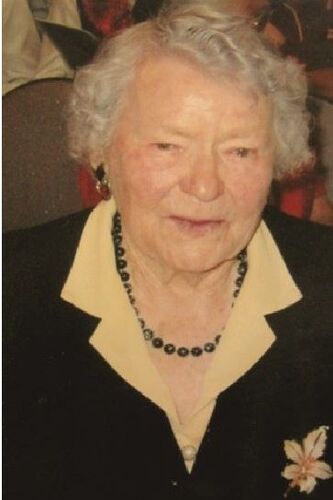POLLARD, Mrs Phyllis May
 Creswick has had a Band since the early days of the Gold Rush. At first it was a Drum and Fife Boys Band, then The Volunteer/Creswick Brass Band. From 1887 to 1910 it had the Jubilee Brass Band; from 1919 to 1925 there was the Creswick Victory Brass Band and from 1932 to ’39 we had the Creswick and District Brass Band.
Creswick has had a Band since the early days of the Gold Rush. At first it was a Drum and Fife Boys Band, then The Volunteer/Creswick Brass Band. From 1887 to 1910 it had the Jubilee Brass Band; from 1919 to 1925 there was the Creswick Victory Brass Band and from 1932 to ’39 we had the Creswick and District Brass Band.
The period that concerns us though, is The Creswick and District Band, which existed, through thick and thin, between 1950 and 2009, the time during which Phyllis Pollard took control.
Following the end of WW2, there was much optimism and community-building in Creswick. In 1950 some dusty musical instruments were found in the Creswick Town Hall, sparking interest in the reforming of The Creswick and District Band, which had dwindled during war time. A public meeting was held with the aim of forming a boy’s band. Enter Phyllis Pollard.
Phyllis was raised at Red Hill, Victoria, and as the eldest of nine children, did most of the cooking and housework. She was schooled by correspondence and then helped her father on the farm.
She married and had six children, some of whom wanted to play in the band, so Phillis joined the first Committee. By the next year she was elected Secretary, a position she held for twenty-one years, and her boys, Keith, Robert and Ian, signed up.
What a task lay ahead of the band and its committee, led by Phyllis. Much money had to be raised. A home for the band had to be found. More instruments were required – only eleven had been retrieved from the Town Hall and most needed repair of some sort. Boys had to be taught to play the instruments. Uniforms were necessary.
There was no money at first to buy uniforms, so Phyllis and the other mothers made them. Then they formed a “Help to Dress a Band Boy” club. The boys themselves peddled around Creswick collecting donations. Fundraising activities were constant. To ensure the band’s ongoing success she also organised euchre nights, debutant balls and she even catered for weddings and functions to raise money.
Maureen E. C. French, in her book Following the Bands, said “… by 1951 there were fifty-one members in total, from school age to ex-servicemen from WW2. Many of these men had played in the previous band.” Maureen also wrote that she believed Phyllis’s contribution to the formation and perpetuation of the Creswick District Band cannot be overstated. Her forte was organising, both people and events.
Phyllis was a skilled publicist, and never a month went by that she didn’t have an article in the paper talking of the band’s progress and achievements. She would inform the community that this was due to their generosity and support, thus instilling a feeling of civic pride for the band.
She was a forerunner of the liberation movement. One of her main intentions in reforming the band was for equal opportunity for women to be involved, and this took place very successfully with women as directors and conductors of the band and many female band members going on to pursue a musical career.
Phyllis took care of every aspect of the band including keeping it equipped with instruments and uniforms, and ensuring performances were at the highest level. She encouraged everyone to join, and not being able to play music was never seen as an obstacle. People joined and quickly learned to play, even if they had no prior knowledge or experience.
Phyllis held the position of Secretary of the band for twenty-one years. She also served as Treasurer for seventeen years and upon her retirement, served as a mentor to the band and individuals for a further twenty years, until 2009.
When Tom Evans, MLA, OAM, heard of her resignation as Secretary he wrote to her saying:
“You can accept great satisfaction for the fact you are primarily responsible for retaining this band in Creswick. It is now well known over the south-east of
Australia and has contributed greatly to the general welfare of the Creswick District. You have made a worthy contribution to the town, also to the many young people who had the opportunity of learning to play a band instrument.”
Along with the band, Phillis was involved in many aspects of community, but most of all she is known as founder, patron, benefactor, fan and supporter, and well and truly deserved the title “Mother of the Band”. From the first public meeting in 1950 until her death in 2009, Phyllis gave unstinting service to Creswick.
Learn More About our Society
- Family History
- Creswick & District
- Migration
- Honour Roll
- Membership
Contact Creswick and District Historical Society today. We would love to hear from you!
